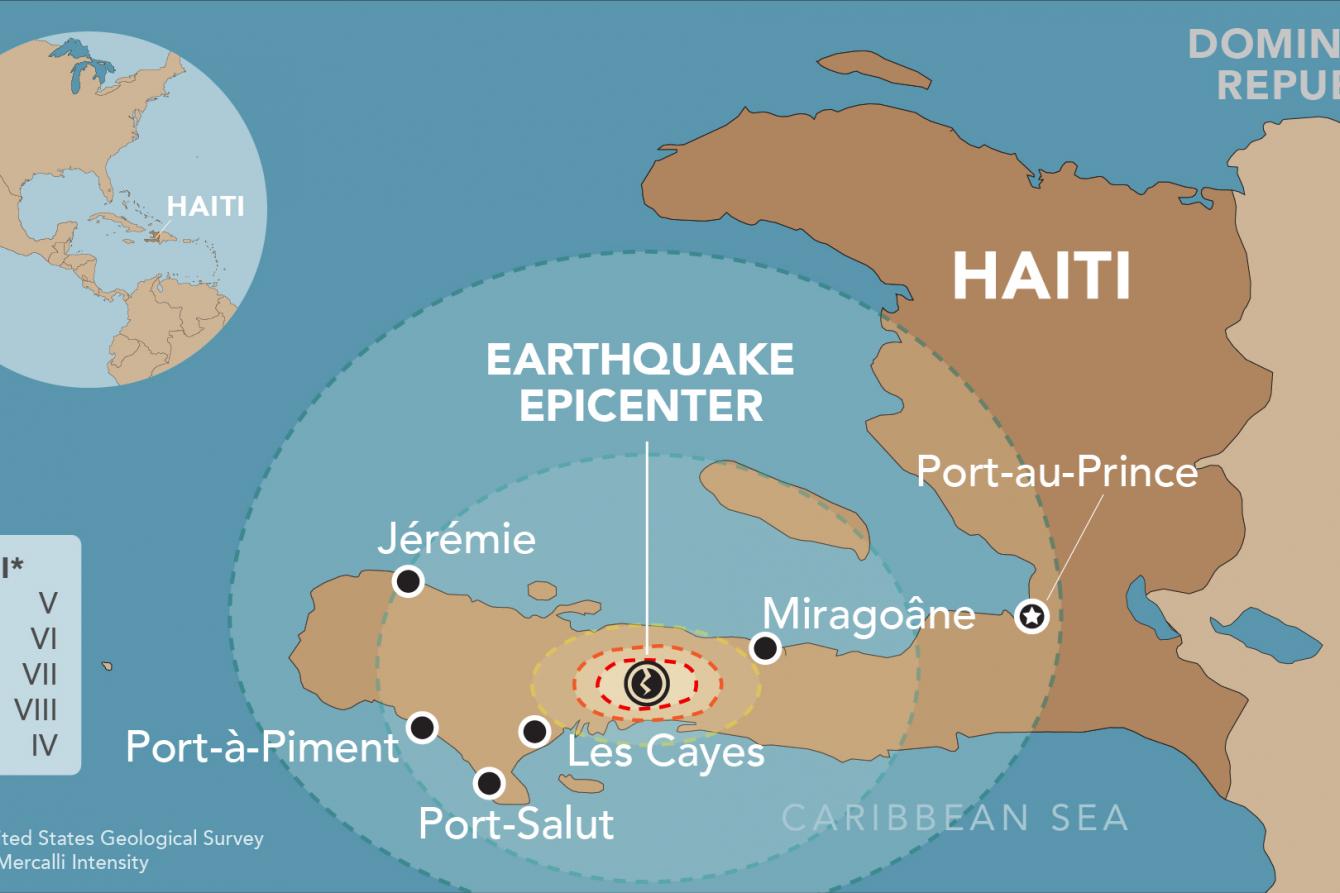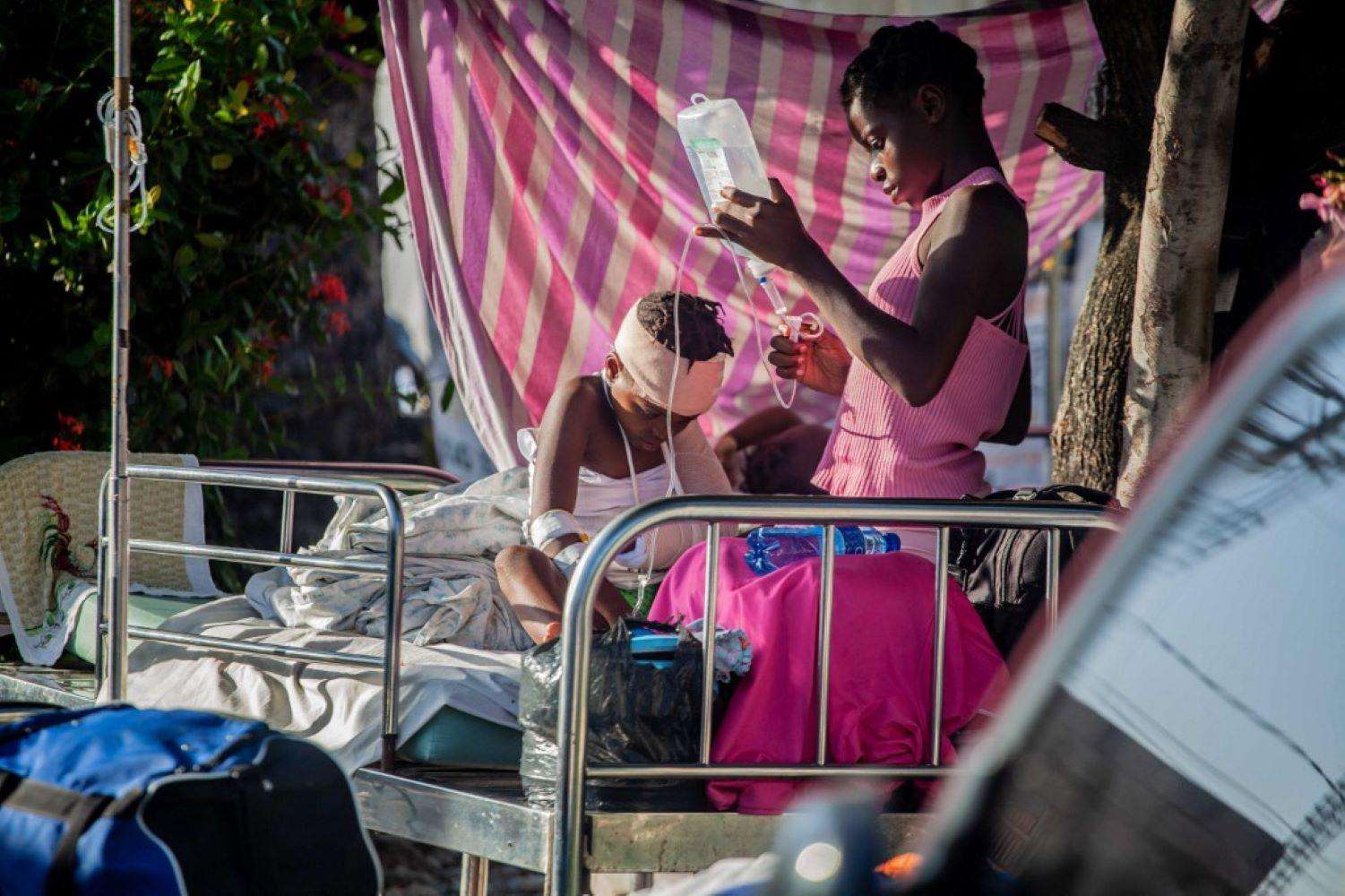Updated on August 16, 2021
At 8:30 a.m. on August 14, a magnitude 7.2 earthquake struck the southern region of Haiti, specifically the provinces of Grande Anse, Nippes, and Sud. As of August 16, the death toll has climbed to over 1,400 with some 6,000 people injured, according to Haiti’s Office for Civil Protection. These figures are expected to change in the coming days, as many municipalities in the affected areas remain isolated from the rest of the country.
Homes and infrastructure, including medical facilities, have been destroyed and damaged in the affected region. Some hospitals had to evacuate their patients, and some lack medical equipment and medicines. Aftershocks and landslides have caused additional damage.

Doctors Without Borders/Médecins Sans Frontières (MSF) teams are on the ground in Haiti providing medical care. We are responding to the emergency in the cities of Port-Salut, Les Cayes, and Jérémie, assessing the needs in other areas, and preparing to send in additional medical equipment, essential items, and medical teams to help care for the injured. "Our current priorities are, above all else, to get a precise idea of the medical situation, to provide direct care to the injured when we can, or to refer them to functional medical structures once we ensure they are stabilized," says Alessandra Giudiceandrea, head of mission for MSF in Haiti. Whenever possible, MSF medical teams help refer the injured to functional health facilities.
Tropical depression Grace is expected to hit earthquake-affected areas of Haiti with heavy rains on Monday night, raising additional concerns. "Several health facilities have had to evacuate their patients from their buildings due to structural damage or for fear of aftershocks, such as at St. Antoine Hospital in the city of Jérémie, where we are working. Many patients are outside or in tents, and now heavy rains are expected tonight. Not to mention all the Haitians who have lost their homes," says Michel-Olivier Lacharité, head of emergencies at MSF.

Evolving response to the disaster in the south
In the first hours after the earthquake, the MSF team based in Port-à-Piment and an emergency medical team from Port-au-Prince began assisting injured patients in Sud province. The hospital in Port-à-Piment where MSF provides sexual and reproductive health care was damaged. The patients, most of whom were receiving maternal health care, were evacuated to a tent where the MSF team continues to provide care. In Port-à-Piment, MSF is also stabilizing patients injured by the earthquake.
In Port-Salut, an MSF team received at least 16 patients with injuries and fractures, including patients referred from Port-à-Piment and Les Cayes. MSF and its partners are stabilizing the wounded and providing surgical and follow-up care.
In Les Cayes, an MSF team is providing medical supplies to the general hospital.
An MSF team is assessing needs in the more remote location of Les Anglais and has been transporting patients from Les Anglais to Port-a-Piment and other areas. Vehicles are unable to travel the entire way to Les Anglais at the moment so patients must be shuttled between two different vehicles, making the trip especially difficult.
An MSF team arrived on August 15 in Nippes, and visited the Sainte-Thérèse hospital in Miragoâne, which has received 59 wounded. MSF donated supplies to the hospital and an MSF surgeon and nurse are providing medical support. Another team is assessing the situation in Baradères and Petit Trou in Nippes, which have reportedly been seriously affected.
MSF also sent emergency supplies from Port-au-Prince to Sud (first aid kits, tents for emergency clinics, medicines, and supplies for blood transfusions and plaster casts). Some access routes, such as the road between Les Cayes and Jérémie, are seriously damaged, and complicate the deployment of aid. However, an MSF team, including two surgeons and an operating room nurse, brought medical supplies to Jeremie on August 15 and began working in the town's hospital.

MSF plans to reinforce its activities in the coming days, sending more medical teams, including surgeons. MSF is preparing to send medical and emergency supplies from abroad, including two cargo planes from Brussels.
Providing care in Port-au-Prince
In Port-au-Prince, the earthquake fortunately did not damage any infrastructure or buildings. Our teams, who have been working for several years at the Tabarre Hospital, have received 12 injured patients from the earthquake zone.
To address potential blood shortages, MSF launched a blood collection campaign in the Turgeau neighborhood of Port-au-Prince on August 14, in partnership with local authorities. MSF accelerated the opening of its activities at the Integrated Diagnosis and Treatment Centre (CDTI), commonly known as the Sacré-Cœur Hospital, in order to be able to stabilize injured patients and refer them elsewhere. In one day, 25 injured patients were received.
MSF has been present in Haiti for 30 years. Our regular activities continue, including at the Tabarre hospital in Port-au-Prince, where MSF is treating severely burned patients as well as people with life-threatening injuries. MSF also provides maternal and sexual and reproductive health care in Port-a-Piment in Haiti's Sud province and treats victims of sexual and gender-based violence in Port-au-Prince and Gonaïves. After more than 15 years, MSF was forced to close its emergency center in Martissant, Port-au-Prince, after an armed group fired on the facility on June 26, putting medical staff and patients at risk. Earlier in the year, MSF was forced to relocate its burns hospital from Drouillard to Tabarre due to insecurity.




